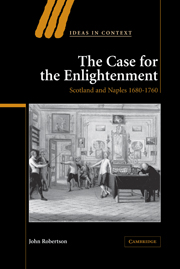Book contents
- Frontmatter
- Contents
- Preface
- 1 The case for the Enlightenment
- 2 Scotland and Naples in 1700
- 3 The intellectual worlds of Naples and Scotland 1680–c.1725
- 4 The predicament of ‘kingdoms governed as provinces’
- 5 Vico, after Bayle
- 6 Hume, after Bayle and Mandeville
- 7 The advent of Enlightenment: political economy in Naples and Scotland 1730–1760
- Conclusion: the Enlightenment vindicated?
- Bibliography
- Index
- IDEAS IN CONTEXT
2 - Scotland and Naples in 1700
Published online by Cambridge University Press: 15 October 2009
- Frontmatter
- Contents
- Preface
- 1 The case for the Enlightenment
- 2 Scotland and Naples in 1700
- 3 The intellectual worlds of Naples and Scotland 1680–c.1725
- 4 The predicament of ‘kingdoms governed as provinces’
- 5 Vico, after Bayle
- 6 Hume, after Bayle and Mandeville
- 7 The advent of Enlightenment: political economy in Naples and Scotland 1730–1760
- Conclusion: the Enlightenment vindicated?
- Bibliography
- Index
- IDEAS IN CONTEXT
Summary
If the primary purpose of this book is to make the case for the Enlightenment as a coherent, Europe-wide intellectual movement, its substance derives from studying Enlightenment's emergence in two distinct, contrasting contexts, the kingdoms of Scotland and Naples. These contexts now need to be evoked and set before the reader. Accordingly the aim of this and the following chapter is to establish the framework from which Enlightenment thinking was subsequently to emerge in the two places. In the present chapter, the focus will be on the political, economic, and social circumstances of the two kingdoms at the turn of the seventeenth and eighteenth centuries; in the next, it will be on the structures of intellectual life. Following Bloch's guidelines for comparative history, these chapters will be studies in dissimilarity, highlighting the many, often marked differences between the two countries' political systems, economic condition, and intellectual culture. At the same time, it will be seen that the dissimilarities were not so great as to prevent the historian from observing patterns of convergence in both the political and economic situations and the intellectual interests of the Scots and the Neapolitans. In neither case was the convergence straightforward or exact; but it was sufficient to establish a common ground of experience between the two countries, while enabling thinkers in both to draw on the same intellectual resources.
- Type
- Chapter
- Information
- The Case for The EnlightenmentScotland and Naples 1680–1760, pp. 52 - 93Publisher: Cambridge University PressPrint publication year: 2005



